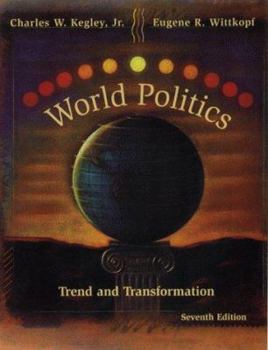World Politics
No Synopsis Available.
Format:Paperback
Language:English
ISBN:0333752384
ISBN13:9780333752388
Release Date:December 1998
Publisher:Macmillan Press
Length:608 Pages
Weight:2.57 lbs.
Customer Reviews
5 ratings
Best used deal I could find
Published by Thriftbooks.com User , 14 years ago
The price was better than if I had tried to purchase this book new or used in a bookstore or another site. The book came in great condition, with very few signs of use and only some highlighting, underlining, and markings. As far as the book itself, it's in depth and interesting, but I can honestly say that I wouldn't be reading if it wasn't a textbook requirement. :)
Exactly as Described
Published by Thriftbooks.com User , 15 years ago
Was delivered in a timely manner and was exactly as described. I would definately use this seller again!!!
Uses a Comprehensive World View
Published by Thriftbooks.com User , 15 years ago
I really liked this book because it doesn't just present one world view, instead, like any good IR text should, it covers multiple. It's also very good at debunking some of the neo-conservative world views. On a special note, it also has great information on debunking the myth that Ronald Reagan ended the cold war (in reality he prolonged it with his rhetoric and military posturing as this book documents). If you are a hard right hawk, I'm sure you'll find much lacking. Ditto if you only subscribe to the realist view of things. But, if you want to go beyond American Nationalism, and towards a more educated view of the world, this book is a great starting place.
Current makings considered
Published by Thriftbooks.com User , 19 years ago
Kegley and Wittkopf take into consideration that the current international political system is in the process of being developed. There are still to many unanswered questions regarding what type of power structure will result, and whether the events of 9/11, humanitarian intervention, globalization, and the rise of the EU and China will have transforming affects on the global arena. Further, many facets are considered regarding the increased role of non-state actors like NGO and individuals having a voice. It's worth the read as current events and issues are at the focal point of the structure of the international system.
Memorable Textbook
Published by Thriftbooks.com User , 19 years ago
I read an earlier paperback edition of this textbook for my class in Intl. Relations at Northwestern University in 1987. Somehow it was misplaced since then, but I never forgot it. My 15 year old son has expressed an interest in learning more about the world than what he is fed in school, so I ordered a new copy, and now he's reading it. The book covers all aspects of the post WWII world order, which still governs most of what takes place today. My only complaint about this text, and why I did not give it five stars, is that it seems to be a bit idealistic about what can be done to solve the world's problems. As a student, I actually believed that diplomacy, the UN, other NGO's etc. could substantially change the tendency toward using violence to solve disputes. And that reducing north-south inequality was an important key to this. East-west tensions were supposed to be reduced by negotiation. While that has been true to a small degree, the past 20 years have been shaped by nations acting in their own economic and military self-interest and a sharp rise in sectarian violence. And the cold war was won by the West economically, not by some negotiated settlement with communism. The end of the cold war also unleashed dozens of formerly quiescent nationalist movements. I don't think Kegley and Wittkopf address these issues adequately. They don't take into account basic human nature and historic inevitability of conflict. Also, the push for impossible north-south equality and first world guilt is annoying. Trade is far better than aid. Many many more countries in the south are moving from dependency to industrialization, reducing the legacy of colonialism, and hence the importance of north-south wealth transfers. Still, the ideals behind attempts to move toward a more benevolent world order are worth pursuing, and this book is an excellent introduction of those concepts. It's important to keep the authors' bias in mind, however, because history has not been kind to idealists. (Even in the fictional 24th century "United Federation of Planets," there are still wars to be fought.) Regardless of these shortcomings, this book was a vital part of my education. Highly recommended.






